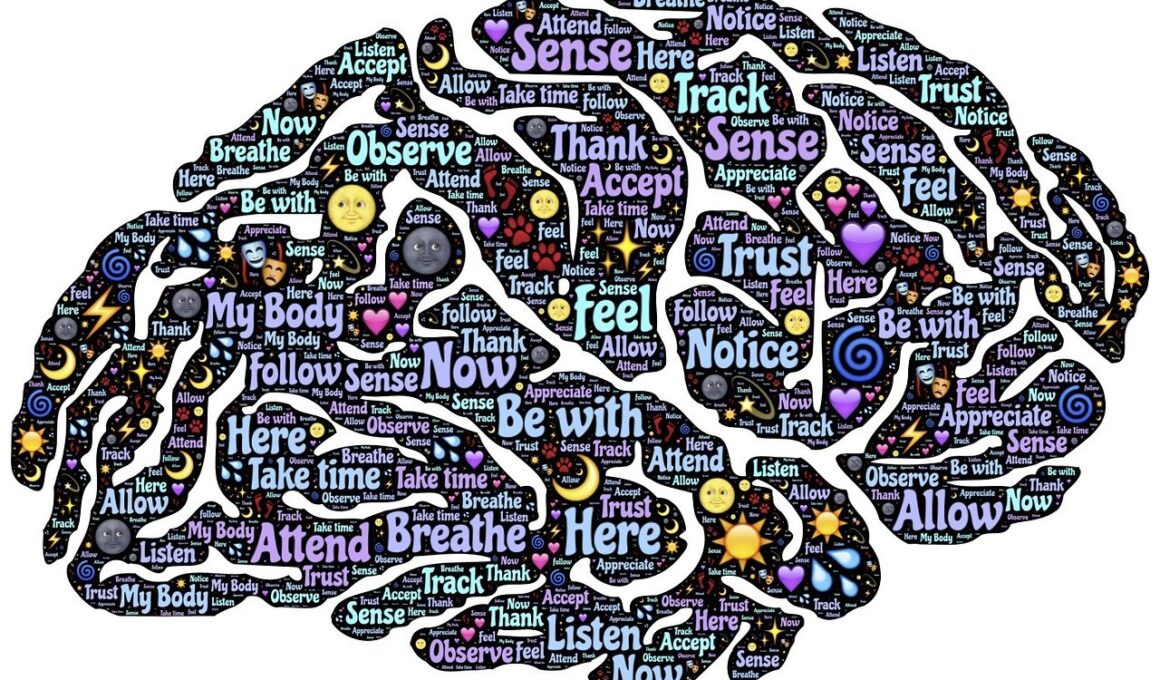Hormonal Changes in Women: Mind-Body Techniques to Manage Symptoms
Hormonal changes in women can lead to a myriad of challenges, especially during periods of transition like menstruation, pregnancy, and menopause. The fluctuations in estrogen and progesterone levels significantly affect both physical and emotional well-being. It is not uncommon for women to experience mood swings, anxiety, and physical discomfort due to these hormonal changes. Understanding the mind-body connection can provide essential insights into managing these symptoms effectively. This holistic approach acknowledges that our emotional health is intrinsically linked to our physical condition. By integrating mind-body techniques, women can cultivate resilience in facing hormonal changes. Techniques such as meditation, yoga, and deep breathing exercises can support emotional regulation. Furthermore, adopting a balanced diet rich in nutrients can influence hormonal balance. Engaging in regular physical activity is also essential as it helps maintain a healthy weight, reduces stress, and improves mood. Practicing mindfulness allows individuals to tune into their bodies, identifying stressors and triggers. Through these strategies, women can take charge of their hormonal health, fostering a greater sense of well-being and empowerment.
The Role of Mindfulness in Hormonal Management
Practicing mindfulness plays a crucial role in managing hormonal changes and their accompanying symptoms in women. Mindfulness involves being present in the moment and observing thoughts and feelings without judgment. This practice can be particularly beneficial during times of hormonal fluctuation. When women feel overwhelmed by mood swings or anxiety, mindfulness techniques can help ground them. Regular mindfulness practice, such as meditation or focused breathing, calms the mind and releases tension stored in the body. By developing greater self-awareness, women can learn to identify the triggers of their emotional spikes, allowing for healthier coping strategies. Integrating mindfulness into daily routines can alleviate symptoms such as irritability and fatigue. Additionally, research has shown that mindfulness can lower cortisol levels, the stress hormone that negatively impacts hormonal balance. Engaging in mindful eating practices encourages women to nourish their bodies consciously, enhancing overall health. Spending time in nature and connecting with one’s environment can also foster a mindful attitude. This focus on personal well-being not only supports hormonal health but enriches life experiences, promoting emotional clarity and balance.
Another effective approach for managing hormonal changes is through yoga, which combines physical movement with breath control and mindfulness. The practice of yoga enhances flexibility, strength, and balance within the body, positively impacting physical symptoms caused by hormonal fluctuations. Specific yoga poses can help regulate the endocrine system, which is responsible for hormone production. By focusing on deep, intentional breathing during yoga, women can activate the parasympathetic nervous system, reducing stress and promoting relaxation. Research has indicated that regular yoga practice may alleviate symptoms like hot flashes, mood swings, and anxiety typically associated with menopause. Classes that incorporate restorative yoga also provide additional benefits, allowing practitioners to release tension and stress. Furthermore, yoga fosters a supportive community environment, providing social connections that are essential for mental health. Participating in group classes can be especially empowering for women who share similar experiences regarding hormonal changes. As women learn to navigate their symptoms through yoga, they may find a renewed sense of control and acceptance over their bodies, enhancing their quality of life.
Exercise in a broad sense contributes to balancing hormones and managing their effects on emotional health. Physical activity stimulates endorphin production, known for their mood-enhancing qualities. Engaging in regular aerobic exercise, strength training, or even moderate walking helps combat depression and anxiety associated with hormonal fluctuations. For women undergoing menopause, exercises like Pilates can improve core strength and stability, while also providing mental relaxation. Finding enjoyable forms of physical activity is crucial in sustaining motivation and commitment. Exploring outdoor activities, group sports, or dance classes can promote a fun, social aspect that further enhances emotional well-being. Consistency in exercise routines also plays a significant role in achieving desired hormonal health outcomes. Maintaining a balanced approach is essential, as over-exercising can lead to adverse effects such as excessive stress and hormonal imbalance. It’s vital to listen to one’s body and adapt routines as necessary to promote healing and alignment with personal needs. Integrating exercise with other mind-body techniques ensures a holistic approach to hormone management, allowing women to feel empowered and in control.
Nourishing Foods for Hormonal Balance
Nutrition plays an integral role in managing hormonal health, impacting everything from energy levels to mood balance. Consuming nutrient-dense foods is essential for supporting hormone production and regulation. Foods rich in omega-3 fatty acids, such as fatty fish, walnuts, and flaxseeds, help reduce inflammation and stabilize hormones. Complex carbohydrates from whole grains and legumes provide sustained energy and alleviate mood swings. Additionally, incorporating plenty of fruits and vegetables can optimize phytonutrient intake, promoting overall health. Cruciferous vegetables, like broccoli and kale, specifically help the liver process excess hormones effectively. Hydration is equally crucial for maintaining hormonal balance; adequate water intake supports metabolic processes and toxin elimination. Limiting processed foods and added sugars can help prevent hormonal imbalances, as these food categories can lead to insulin spikes and emotional fluctuations. Mindful eating practices, focusing on portion control and the quality of food, can amplify the effects of nutritional strategies. Developing a personalized meal plan that considers individual preferences and dietary restrictions can facilitate hormonal health, enabling women to thrive during fluctuating hormonal phases.
Adequate sleep is another critical factor influencing hormonal health in women. Lack of sleep can exacerbate hormonal fluctuations, leading to increased symptoms such as irritability, anxiety, and fatigue. Establishing a healthy sleep routine is essential for regulating hormones like cortisol and melatonin. Practices such as maintaining a consistent sleep schedule support the body’s natural circadian rhythm, optimizing hormone production. Creating a calming pre-sleep environment is valuable; dimming the lights, reducing screen time, and engaging in relaxation techniques can promote better sleep quality. Limiting caffeine and heavy meals before bedtime also encourages deeper rest. Techniques like deep breathing, meditation, or gentle stretching can help unwind the body and mind, facilitating a restful night’s sleep. Women experiencing hormonal changes may particularly benefit from these strategies, as sleep disturbances can aggravate symptoms. Prioritizing sleep hygiene sends a powerful message to the body about self-care and well-being. Through mindful attention to these habits, women can reclaim control over their health, positively impacting their overall hormonal balance and emotional resilience.
Seek Support and Connection
Building social connections and seeking support from others can profoundly impact women experiencing hormonal changes. Emotional well-being is closely tied to social interactions and relationships. Engaging with supportive friends or joining community groups can provide reassurance and empathy during challenging times. Sharing experiences with those in similar situations can alleviate feelings of isolation and enhance coping strategies. Online forums or support groups focusing on hormonal health offer a safe space to discuss concerns and share insights. Additionally, professional guidance from holistic practitioners or therapists specializing in women’s health can be beneficial. They can provide personalized guidance and explore the mind-body link further, using techniques like cognitive-behavioral therapy (CBT) or guided imagery. Holistic practices, including acupuncture and massage therapy, also offer avenues for exploring emotional health during hormonal transitions. Seeking out these resources fosters a sense of agency, allowing women to navigate their circumstances more effectively. Women should value and prioritize their mental health, recognizing it correlates with overall health. By fostering supportive relationships and utilizing professional resources, women can develop a comprehensive approach to managing their hormonal health effectively.
In conclusion, addressing hormonal changes through mind-body techniques enables women to cultivate better emotional and physical health. The interplay between hormones and emotional well-being is undeniable, making it crucial for women to develop strategies to manage their symptoms. Techniques such as mindfulness, yoga, exercise, proper nutrition, and sleep hygiene collectively contribute to balanced hormonal health. Moreover, seeking social support and establishing strong relationships play significant roles in maintaining emotional resilience during hormonal changes. Implementing these approaches empowers women to take charge of their health, allowing them to navigate transitions with confidence. By embracing the mind-body connection, women can gain deeper insights into their bodies, promoting self-awareness and acceptance. As they become attuned to their needs, they may discover their innate abilities to cope with hormonal fluctuations effectively. Ultimately, encouraging a proactive stance towards managing hormonal health can transform personal experiences, fostering overall wellness and strength. Each woman’s journey is unique, and by incorporating these mind-body principles, they can create a personalized action plan that enhances quality of life. Understanding and embracing hormonal health is a valuable empowerment tool for all women, making it essential to share this knowledge.


